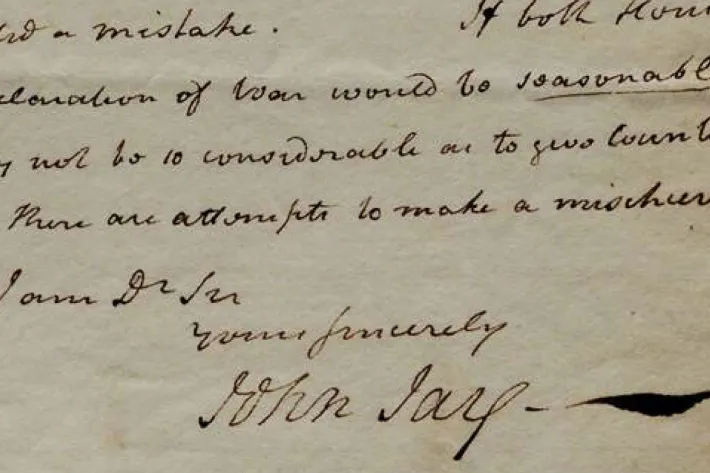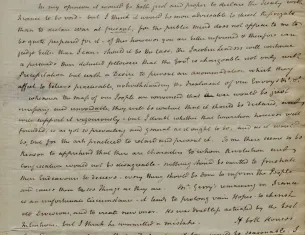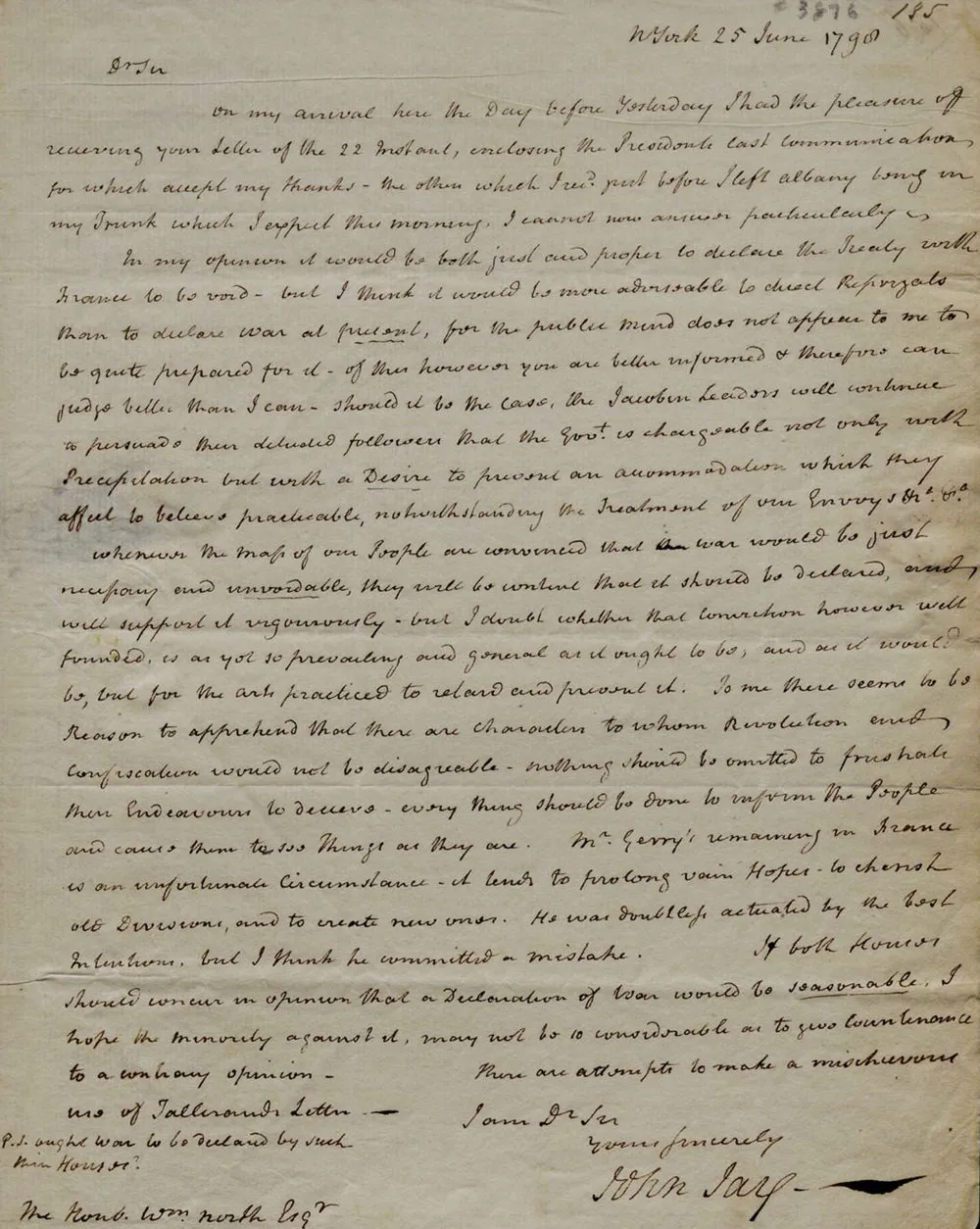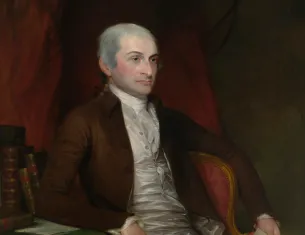John Jay on the Quasi-War with France, 1798

John Jay to William North, June 25, 1798. (The Gilder Lehrman Institute of American History)
Both Presidents George Washington and John Adams proclaimed American neutrality in the wars between Great Britain and France in the 1790s. Nevertheless, relations between France and the United States worsened and an undeclared (“quasi”) naval war began in 1798 when France seized American ships that were carrying goods to and from Great Britain. The US attempted to settle the problem diplomatically, but the effort was undercut by the XYZ Affair. In this letter, dated June 25, 1798, Governor of New York John Jay, who had served as an American diplomat in Europe, responded to Senator William North’s request for advice on declaring war against France.
A Letter from John Jay to William North, June 25, 1798
NYork 25 June 1798
Dr Sir
On my arrival here the Day before Yesterday I had the pleasure of receiving your Letter of the 22 Instant, enclosing the Presidents last communication for which accept my thanks – the others which I recd. just before I left Albany being in my Trunk which I expect this morning. I cannot now answer particularly –
In my opinion I would be both just and proper to declare the Treaty with France to be void – but I think it would be more advisable to direct Reprizals than to declare war at present, for the public mind does not appear to me to be quite prepared for it – of this however you are better informed & therefore can judge better than I can – should it be the case, the Jacobin Leaders will continue to persuade their deluded followers that the Govt. is chargeable not only with Precipitation but with a Desire to prevent an accommodation which they affect to believe practicable, notwithstanding the Treatment of our Envoys &ca. &ca.
Whenever the mass of our People are convinced that the war would be just necessary and unavoidable, they will be content that it should be declared, and will support it vigourously. but I doubt whether that conviction however well founded, is as yet so prevailing and general as it ought to be, and as it would be, but for the arts practiced to retard and prevent it. To me there seems to be Reason to apprehend that there are characters to whom Revolution and confiscation would not be disagreable – nothing should be omitted to frustrate their Endeavours to deceive – every thing should be done to inform the People and cause them to see Things as they are. Mr. Gerry’s remaining in France is an unfortunate Circumstance – it tends to prolong vain Hopes – to cherish old Divisions, and to create new ones. He was doubtless actuated by the best Intentions. but I think he committed a mistake. If both Houses should concur in opinion that a Declaration of War would be seasonable. I hope the minority against it, may not be so considerable as to give Countenance to a contrary opinion. There are attempts to make a mischievous use of Tallerand’s Letter.
I am Dr Sir
Yours Sincerely
John Jay
P.S. ought war to be declared by such
Vain houses?
The Honb. Wm. North, Esqr
Source: John Jay to William North, June 25, 1798, The Gilder Lehrman Institute of American History, GLC02528.
A Letter from John Jay to William North, June 25, 1798
NYork 25 June 1798
Dr Sir
On my arrival here the Day before Yesterday I had the pleasure of receiving your Letter of the 22 Instant, enclosing the Presidents last communication for which accept my thanks – the others which I recd. just before I left Albany being in my Trunk which I expect this morning. I cannot now answer particularly –
In my opinion I would be both just and proper to declare the Treaty with France to be void – but I think it would be more advisable to direct Reprizals than to declare war at present, for the public mind does not appear to me to be quite prepared for it – of this however you are better informed & therefore can judge better than I can – should it be the case, the Jacobin Leaders will continue to persuade their deluded followers that the Govt. is chargeable not only with Precipitation but with a Desire to prevent an accommodation which they affect to believe practicable, notwithstanding the Treatment of our Envoys &ca. &ca.
Whenever the mass of our People are convinced that the war would be just necessary and unavoidable, they will be content that it should be declared, and will support it vigourously. but I doubt whether that conviction however well founded, is as yet so prevailing and general as it ought to be, and as it would be, but for the arts practiced to retard and prevent it. . . . Mr. Gerry’s remaining in France is an unfortunate Circumstance – it tends to prolong vain Hopes – to cherish old Divisions, and to create new ones. He was doubtless actuated by the best Intentions. but I think he committed a mistake. If both Houses should concur in opinion that a Declaration of War would be seasonable. I hope the minority against it, may not be so considerable as to give Countenance to a contrary opinion. There are attempts to make a mischievous use of Tallerand’s Letter. –
I am Dr Sir
Yours Sincerely
John Jay
P.S. ought war to be declared by such
Vain houses?
The Honb. Wm. North, Esqr
Source: John Jay to William North, June 25, 1798, The Gilder Lehrman Institute of American History, GLC02528.
precipitation: rushed, sudden haste
countenance: approval
Background
Both Presidents George Washington and John Adams proclaimed American neutrality in the wars between Great Britain and France in the 1790s. Nevertheless, relations between France and the United States worsened and an undeclared (“quasi”) naval war began in 1798 when France seized American ships that were carrying goods to and from Great Britain. The US attempted to settle the problem diplomatically, but the effort was undercut by the XYZ Affair. In this letter, dated June 25, 1798, Governor of New York John Jay, who had served as an American diplomat in Europe, responded to Senator William North’s request for advice on declaring war against France.
Transcript
A Letter from John Jay to William North, June 25, 1798
NYork 25 June 1798
Dr Sir
On my arrival here the Day before Yesterday I had the pleasure of receiving your Letter of the 22 Instant, enclosing the Presidents last communication for which accept my thanks – the others which I recd. just before I left Albany being in my Trunk which I expect this morning. I cannot now answer particularly –
In my opinion I would be both just and proper to declare the Treaty with France to be void – but I think it would be more advisable to direct Reprizals than to declare war at present, for the public mind does not appear to me to be quite prepared for it – of this however you are better informed & therefore can judge better than I can – should it be the case, the Jacobin Leaders will continue to persuade their deluded followers that the Govt. is chargeable not only with Precipitation but with a Desire to prevent an accommodation which they affect to believe practicable, notwithstanding the Treatment of our Envoys &ca. &ca.
Whenever the mass of our People are convinced that the war would be just necessary and unavoidable, they will be content that it should be declared, and will support it vigourously. but I doubt whether that conviction however well founded, is as yet so prevailing and general as it ought to be, and as it would be, but for the arts practiced to retard and prevent it. To me there seems to be Reason to apprehend that there are characters to whom Revolution and confiscation would not be disagreable – nothing should be omitted to frustrate their Endeavours to deceive – every thing should be done to inform the People and cause them to see Things as they are. Mr. Gerry’s remaining in France is an unfortunate Circumstance – it tends to prolong vain Hopes – to cherish old Divisions, and to create new ones. He was doubtless actuated by the best Intentions. but I think he committed a mistake. If both Houses should concur in opinion that a Declaration of War would be seasonable. I hope the minority against it, may not be so considerable as to give Countenance to a contrary opinion. There are attempts to make a mischievous use of Tallerand’s Letter.
I am Dr Sir
Yours Sincerely
John Jay
P.S. ought war to be declared by such
Vain houses?
The Honb. Wm. North, Esqr
Source: John Jay to William North, June 25, 1798, The Gilder Lehrman Institute of American History, GLC02528.
Excerpt
A Letter from John Jay to William North, June 25, 1798
NYork 25 June 1798
Dr Sir
On my arrival here the Day before Yesterday I had the pleasure of receiving your Letter of the 22 Instant, enclosing the Presidents last communication for which accept my thanks – the others which I recd. just before I left Albany being in my Trunk which I expect this morning. I cannot now answer particularly –
In my opinion I would be both just and proper to declare the Treaty with France to be void – but I think it would be more advisable to direct Reprizals than to declare war at present, for the public mind does not appear to me to be quite prepared for it – of this however you are better informed & therefore can judge better than I can – should it be the case, the Jacobin Leaders will continue to persuade their deluded followers that the Govt. is chargeable not only with Precipitation but with a Desire to prevent an accommodation which they affect to believe practicable, notwithstanding the Treatment of our Envoys &ca. &ca.
Whenever the mass of our People are convinced that the war would be just necessary and unavoidable, they will be content that it should be declared, and will support it vigourously. but I doubt whether that conviction however well founded, is as yet so prevailing and general as it ought to be, and as it would be, but for the arts practiced to retard and prevent it. . . . Mr. Gerry’s remaining in France is an unfortunate Circumstance – it tends to prolong vain Hopes – to cherish old Divisions, and to create new ones. He was doubtless actuated by the best Intentions. but I think he committed a mistake. If both Houses should concur in opinion that a Declaration of War would be seasonable. I hope the minority against it, may not be so considerable as to give Countenance to a contrary opinion. There are attempts to make a mischievous use of Tallerand’s Letter. –
I am Dr Sir
Yours Sincerely
John Jay
P.S. ought war to be declared by such
Vain houses?
The Honb. Wm. North, Esqr
Source: John Jay to William North, June 25, 1798, The Gilder Lehrman Institute of American History, GLC02528.
precipitation: rushed, sudden haste
countenance: approval


